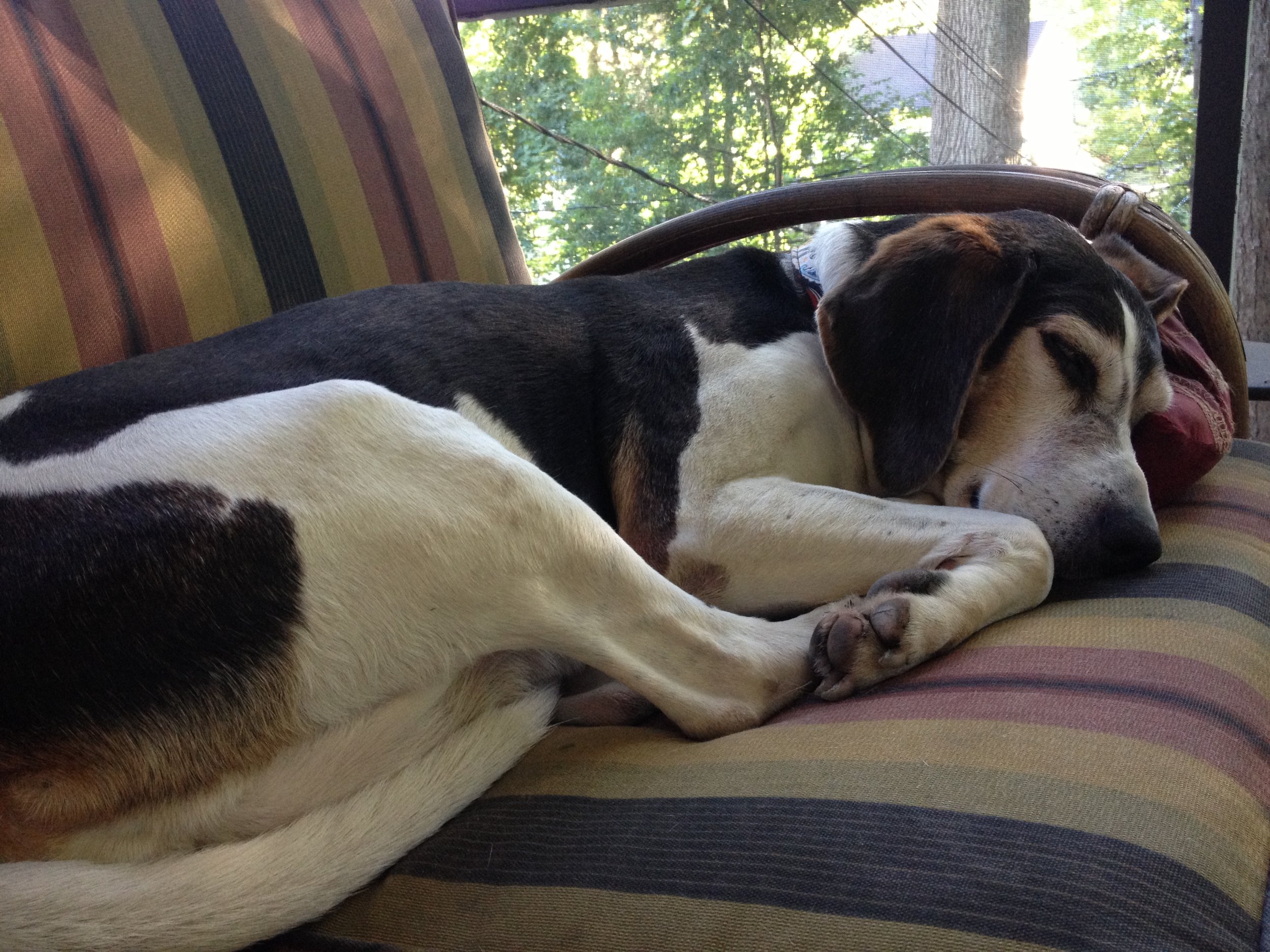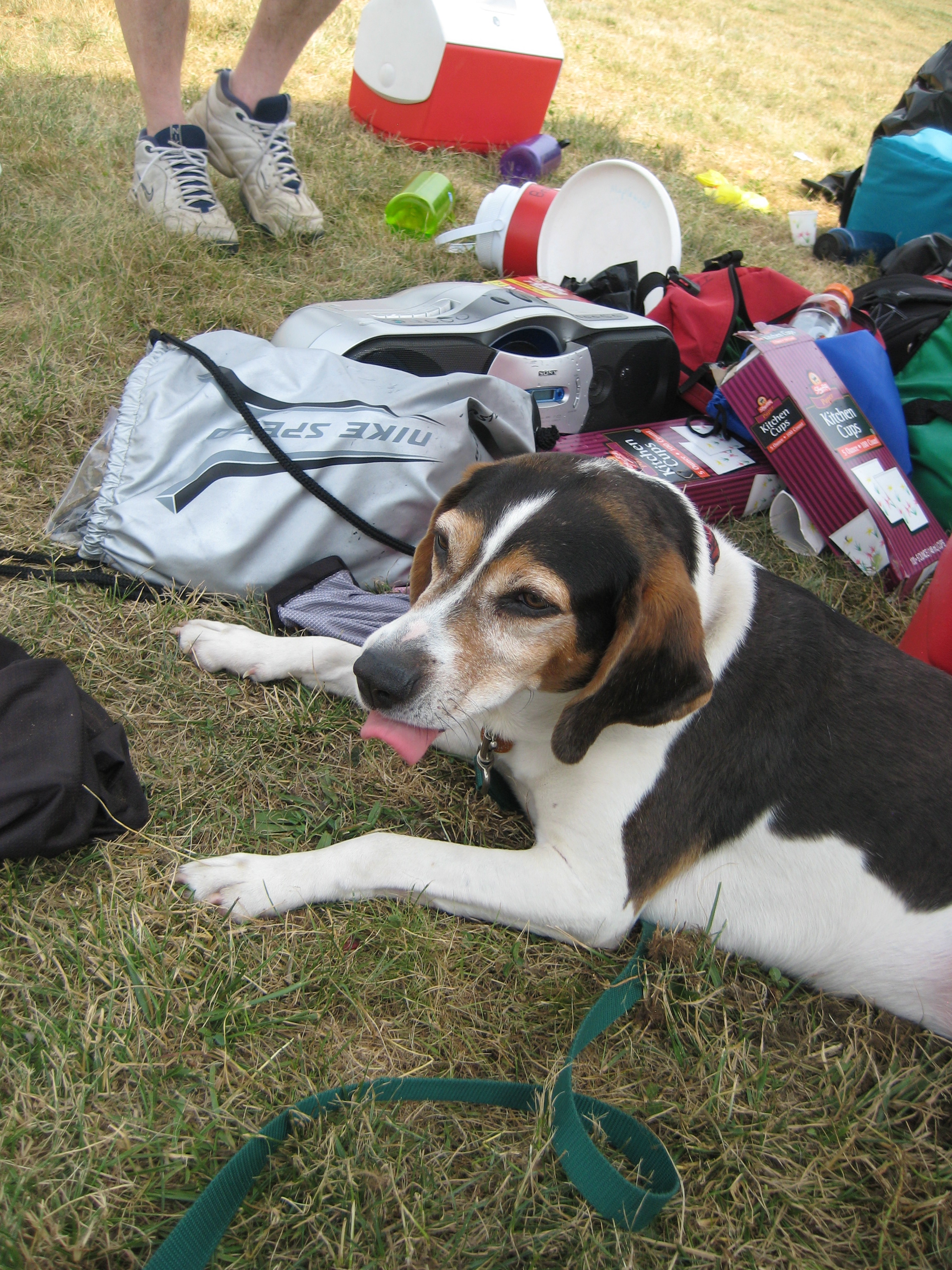Sweet 15 - A Hound's Farewell
I have decided to treat my dog like a celebrity.
In full consideration of Roxy’s greatness, and her failing senses and joints, I am writing her obituary in advance.
HOUNDS SLEEP A LOT; ROXY ON THE SCREEN PORCH
I’ll leave it, not quite completed, in a digital file, like ones that already exist somewhere for Olivia de Havilland or Doris Day -- other elderly females with star power whose impact and inevitable demise are accepted facts. It’s a eulogy, really. And it’s written in these the true dog days of August 2018, when I can be more lucid than I am likely to be when I need this - for real- on (insert date) January 11, 2019 which is now, of course, today.
I don’t know how Roxy, a Treeing Walker Coonhound mix, ended up in a West Virginia kill shelter with the name Melinda. But I know how she became ours.
ROXY’S ARRIVAL IN JANUARY 2005
We took a road trip upstate in our minivan, my husband Michael and I, with our sons Saul and Eli who were 9 and 11. Saul had been reading Where the Red Fern Grows by Wilson Rawls. We borrowed an audio version from the library and listened together, enthralled as we drove. In this lyrical novel, a boy growing up in the Ozarks works for two years to fill a tin can with $40 in savings. To my kids, this sum was slightly less than the price of a video game. The boy in Rawls’ novel spends that money on two Coonhounds.
It’s not really a spoiler to say that you know by Chapter One that the dogs have died. The book is a memoir of childhood, family, pets, raccoon hunting, and how love and loss can intertwine.
Just days after we returned home, a friend mentioned that a rescue Coonhound in need of adoption had been sent north to an animal shelter near our New Jersey home. We’d talked about getting a dog, but so far it was just talk.
‘Do not get a Coonhound. They can never be off leash. They have no road sense.” The warnings came in quick succession, accurate and unconvincing. “The mere scent of a raccoon will set them off howling or running away, usually both. They’re rambunctious and need loads of exercise. Your suburban house is no farm. They’re great with kids, just shouldn’t be yours.”
“A Coonhound” I asked? “A Coonhound, like in Where the Red Fern Grows,” I said again that night after dinner in front of the guys, with no attempt to hide my excitement. “A Coonhound! We had to see her. She was in foster care, temporarily housed in a friend’s place three blocks away. We went there that same January night, all of us tugging on boots under flannel pajama pants, then tearing up the street.
The dog was dopey from being spayed that morning. “But we’re cat people”, Eli suggested with some short-lived doubt. A nasty lump bulged out of her neck. This was more concerning than all the things we’d heard about the impracticality of her breed. So what if she’s a hunter who’s bred to think with her nose. She was a hound with the white black and caramel color of a Beagle. And she came fully equipped with a long open throated howl.
We were in love. And in a crime of passion, we smuggled her into our home before we were screened and approved for adoption. When we passed muster a few days later, we pretended to retrieve her from our neighbors, relieved and so grateful we did not have to give her back.
Pressured to tout every rescue hound as a puppy, shelter handlers put the dog’s age at 8 months. Our vet figured she was twice that. As a compromise, we declared her to be a year old in that winter of 2005.
We were unsure if we’d even have her for long. Her lumps might be cancerous, the vet had warned. Days waiting for biopsy results felt like dog years. It’s odd now to think we were worried about only Roxy’s prognosis and growths that were benign. Michael’s blood cancer diagnosis didn’t come until the same time the following year. Saul, now 23, has had his dog in his life just a bit longer than he could have his father. And for Eli, the same is nearly true.
Michael was better at leading the Big Deal Dog Activity than he was at the daily dog-walking detail. He loved to take Rox for a run in a large dog park two towns away. She raced around till she was muddy and exhausted from proving in front of the boys that she was just as fast as the Whippets or assorted Sheepdogs she met there.
At home, she quickly got the idea she was my dog, loyal to her most consistent source of food and relief. But she lay at Michael’s side when he was immunosuppressed from chemo. This seemed permissible under the medical rules we were given. Just all-in-the-family germs.
When Michael had his first bone marrow transplant, he and I were sentenced together to spend a week in a spare, sterile hospital-run apartment. The kids were farmed out with sleeping bags to the floors of willing friends. And HRH Roxy got the Princess Suite at the Morris Animal Inn.
She had her 15 minutes of media fame the following year when her photo appeared in the How I Got My Job column in the Newark Star Ledger Business section. A short article, with the dog’s name in bold face, described her day-in-day-out pursuit of anything edible.
For most of her life, Roxy had the full run our yard in South Orange, bound, theoretically, by our electric fence. At night the scent of trash-loving possum, roaming deer, or her hard-wired favorite delicacy - raccoon - made her go berserk.
If let out for a late night pee, she’d run off our lawn, angering neighbors and sending us chasing after her distinctive nocturnal bays. Michael and I would call her name, traipsing up and down the street behind our house. We’d shake jars of her treats to lure her back home with the sound of food. When the boys got older they took up this task too. Often the four of us were out on the road searching, calling, and rattling Milkbones.
After Michael died, Roxy would climb on the bed beside me at night. Not at the foot; up near the pillow. “I sleep with my dog now,” I lamented to my friend Julie, who I knew was deeply attached to her Springer Spaniel. “Well of course,” she assured me. “She’s a beating heart.” Hearing that felt like a gut punch; I loved my dog but worried she would be as close as I’d ever get again to a romantic partner. I went home and buried my face in Roxy’s furry neck. My friend was so right. My dog was still there. And, night after night, I was glad she was in my arms.
As Roxy got older she carved out her own life with her peers, spending hours in doggie day care while I was at work and the kids were in school. She travelled to Ultimate Frisbee tournaments, sitting regally atop a stack of gym bags in the back of the car as if hoisted on a paladin, her snout held high above the odor of the cleats.
ROXY ON THE ULTIMATE FRISBEE TOURNAMENT CIRCUIT
When I sold our house and moved into my boyfriend Bob’s no-pets apartment for a year, she was thrust into a transient life among friends, family and the kennel. She spent a college semester in Pittsburgh cared for by Saul, laboring up steep stairs in a narrow old house filled with beer and boys, including two who’d never owned a dog. Seduced by Roxy’s dark, sad hound eyes they struggled with the pangs of leaving her behind each time they went out the door. She had them well-trained.
Reunited with me and Bob and our cat Clay in our new, now dog-friendly Brooklyn home, Roxy clearly benefited from living in an elevator building. At 14 her hind legs had noticeably weakened. She would shake as she stood and her eyes were blue-rimmed from cataracts. Still, she was an ice-breaker in the neighborhood, a way to meet people even as they looked warmly down at her and segued to their stories of older dogs who had died. Day after day, and through each encounter, there was no denying this sign of our current dog demographic.
A city dog in the end who’d come from the Alleghenies to the Jersey burbs, and on to South Brooklyn, Roxy spent her last months walking slowly through the wide open park along the water by the Verrazzano Narrows Bridge. The boys would visit too, now that we’re all New Yorkers again. More recently she’s struggled even to stand, at home and on the street. The rhythmic snores of her long sleeps became the best part of her now quiet company.
The guys said goodbye to her today, knowing she’s had a good life, that she had watched them grow up before we saw her grow old, that when she could, she howled her heart out, and that she traveled with us through love and loss making our own lives all that much better. As Wilson Rawls wrote in his wistful opening chapter:
“Although the old hound had no way of knowing it, he had stirred memories, and what priceless treasures they were. Memories of my boyhood days, an old K.C. Baking Powder can, and two little red hounds. Memories of a wonderful love, unselfish devotion and death in its saddest form.”


